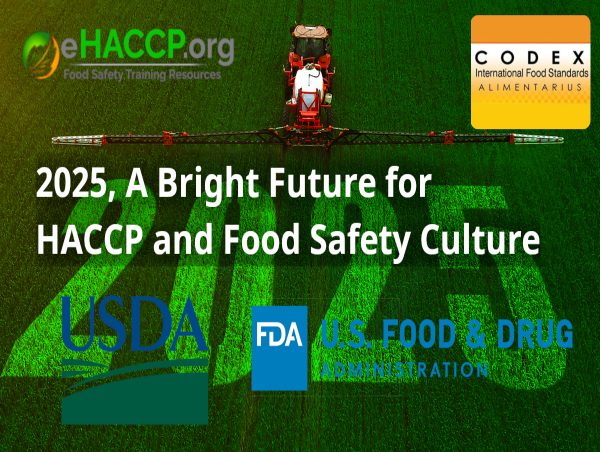The ongoing war in Ukraine and other geopolitical conflicts have significantly disrupted global supply chains, increased price pressures, and created more opportunities for food fraud. These factors have heightened the risk of food safety incidents due to compromised supply chains and unregulated or unsafe food products being introduced into the market.
Mexico has faced challenges such as corruption, security issues related to drug cartels, and infrastructure limitations that can disrupt supply chains.
Regarding HACCP (Hazard Analysis and Critical Control Point) laws, we can anticipate several developments and trends based on current regulatory frameworks and industry directions to help foster a safer food supply for consumers:
Increased emphasis on digital compliance tools:
Organizations' growing focus on digital technologies ensures they meet regulatory and compliance standards more effectively and efficiently. There will likely be a greater integration of digital technologies for HACCP compliance. This includes:
- IoT Devices: These devices are nonstandard computing hardware, such as sensors, actuators, or appliances, that connect wirelessly to a network and can transmit data. They are used for real-time monitoring of critical control points.
- AI and Machine Learning: To predict and manage hazards more efficiently. Artificial intelligence (AI) is a broad term that describes computer software that mimics human cognition to perform complex tasks and learn from them. Machine learning (ML) is a subfield of AI that uses algorithms trained on data to create adaptable models that can perform complex tasks. Willow AI does not offer direct support or tools designed explicitly for HACCP compliance or food safety management. However, AI technologies can be adapted for various uses.
- Blockchain can potentially enhance traceability and transparency in food safety practices. This technology enables secure, clear, and permanent recording of transactions and data. It functions as a decentralized ledger shared across a computer network, with the authority to update the ledger distributed among the network participants.
Global Harmonization Efforts: Efforts to harmonize HACCP standards globally might see progress, aiming for a more unified approach to food safety across different countries. Global harmonization efforts include initiatives to standardize regulations and practices across the world, such as the Globally Harmonized System (GHS) and the Global Harmonization Initiative (GHI):
- Global Harmonized System (GHS) is a system for communicating chemical hazards that includes criteria for classifying hazards, labeling chemicals, and using safety data sheets. The GHS aims to protect human health and the environment by ensuring that information on chemical hazards is available.
- Global Harmonization Initiative (GHI) is a non-governmental initiative promoting harmonizing food safety legislation. The GHI works to achieve a global consensus on food safety issues and provides tools to facilitate this process. Global harmonization can help achieve quality consistency across global operations.
Updates from Codex Alimentarius:
The International Food Standards body might release new guidelines or updates to HACCP principles. They update almost every year. the Codex Alimentarius has released updates to the Hazard Analysis and Critical Control Point (HACCP) principles, including:
HACCP 2023. This revision includes traceability, cleaning program verification, and allergen management updates.
The 2022 revision of this document separated the information on HACCP from the good hygiene practices (GHPs) and moved it into the document's main body. It also includes eight general principles for food safety and suitability.
General Standard for the Labelling of Pre-packaged Foods. This revision includes clarifications and modifications to allergen labeling provisions. It also consists of two tables listing foods and ingredients that trigger food allergies or celiac disease.
Other updates include:
- A food safety culture
- Extended training requirements
- Enhanced good hygiene practices
- Awareness of allergen management
- Validation of CCPs
- A new requirement for record-keeping
HACCP plans should be adjusted if any part of the process changes, such as adding new interventions, processes, or steps. Changes in raw material suppliers, ingredients, or equipment may also require a reassessment of the HACCP plan.
Expanded Scope for Small Businesses:
There might be new or revised regulations to make HACCP more accessible and feasible for small and medium-sized enterprises (SMEs), possibly through:
Simplified Guidelines: Tailored for smaller operations.
Support Programs: These include training or financial assistance for implementing HACCP.
Enhanced Training Requirements:
Regulatory bodies might enforce stricter or more comprehensive training requirements for all levels of food handlers:
Ongoing Education: Emphasis on continuous learning to keep up with new hazards or technological changes.
Certification: Potentially more stringent certification processes for HACCP practitioners.
Focus on New Hazards and Risks:
With evolving food production methods and environmental changes, laws might adapt to include:
Emerging Pathogens: New microbial threats due to climate change or global trade.
Chemical Hazards: Including contaminants from new materials or processes.
Integration with Broader Food Safety Management Systems (FSMS):
HACCP will increasingly be seen as a component of broader FSMS, such as ISO 22000, leading to:
Mandatory Integration: Where HACCP is not just recommended but required within a comprehensive food safety management system.
Public Health and Consumer Protection:
Laws might further emphasize consumer protection through:
Transparency: Requiring more detailed public reporting on HACCP compliance.
Consumer Education: Initiatives to educate consumers about food safety and HACCP.
Regulatory Enforcement and Audits:
Expect an increase in the frequency or depth of audits, with:
Automated Compliance Checks: Using digital tools to streamline the audit process.
These expectations are based on current trends in food safety regulation and the ongoing evolution of HACCP practices. However, exact changes would depend on specific legislative actions, international agreements, and advancements in food safety technology by 2025.
Stephen Sockett
eHACCP.org
+1 866-488-1410
email us here
Visit us on social media:
Facebook
X
LinkedIn
YouTube
Other
Legal Disclaimer:
EIN Presswire provides this news content "as is" without warranty of any kind. We do not accept any responsibility or liability for the accuracy, content, images, videos, licenses, completeness, legality, or reliability of the information contained in this article. If you have any complaints or copyright issues related to this article, kindly contact the author above.
![]()



